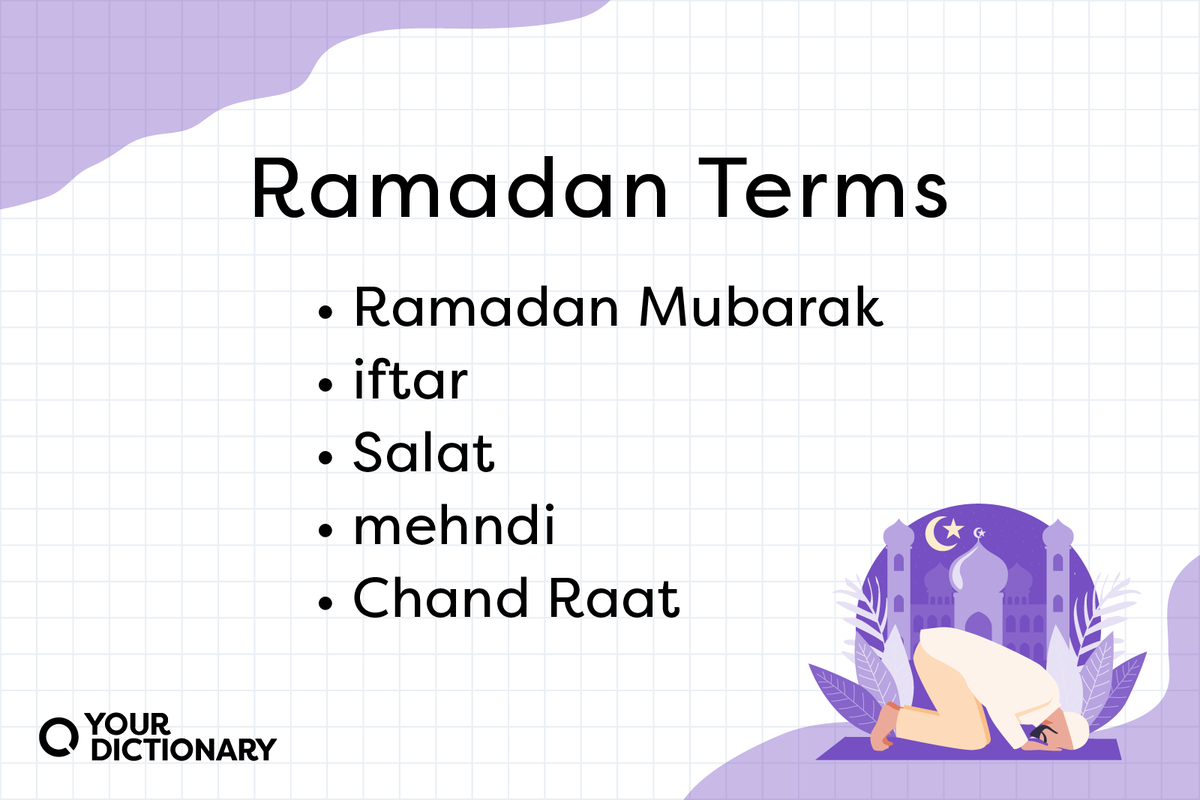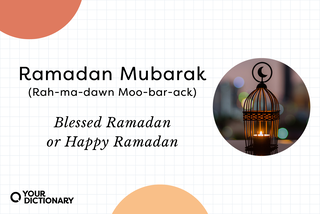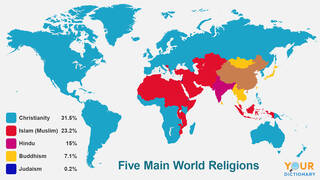
Ramadan Mubarak!
Ramadan is the ninth month of the Islamic calendar. During the holy period of Ramadan, Muslim celebrants fast from dawn to dusk and pray with their community to remember the revelation of the Qurʾān (the Islamic holy book).
But when is Ramadan, what are some common terms associated with the holiday, and what traditions do Muslims celebrate during this sacred time?
When Is Ramadan?
Because the Islamic calendar is tied to the lunar cycle (which is ten days shorter than the Western Gregorian calendar), Ramadan occurs at a different time each year.
It begins on the night of the ninth crescent moon over Mecca, known as the Hilāl, and fasting begins the next day.
Ramadan lasts for one lunar month (around 28–30 days).
- 2023 - March 23rd
- 2024 - March 10th
- 2025 - February 28
- 2026 - February 10

Thoughtful Ramadan Greetings and Wishes to Share
Other Names for Ramadan
The month is known as Ramadan in Arabic, but varies slightly in other Islamic communities around the world.
|
Name for Ramadan |
Language |
|
Ramazani |
Albanian |
|
Ramzān |
Hindi (रमज़ान), Punjabi (ਰਮਜ਼ਾਨ), Urdu (رمضان) |
|
Ramazān |
Persian |
|
Rabadaan |
Somali |
|
Romadon |
Thai (เราะมะฎอน) |
|
Ramazan |
Turkish |
Ramadan Traditions and Terms
Today, over 90% of Muslims around the world (and over 80% of U.S. Muslims) observe Ramadan. While one person’s observance of Ramadan may differ from another, several traditions and terms are central to the Ramadan celebration.
Sawm (Fasting)
One of the five pillars of Islam, sawm, is the tradition of fasting between dawn and dusk during Ramadan.
After the sun sets, Muslims are encouraged to eat halal (dietary practices according to Islamic law) for the duration of Ramadan.
Fast Fact
You can wish Muslim friends “Siyam Kareem” (“blessed fasting”) during Ramadan.
Suhoor (Pre-Fasting Meal)
Before the sun rises, Ramadan celebrants eat suhoor, or pre-fasting meal, to prepare for their day of fasting.
In many Islamic cultures, drummers (known as davul or Musaharati) beat their drums in the street to wake people up before dawn so they can eat their suhoor.
Iftar (Fast-Breaking Meal)
After the sun sets, Muslims eat iftar (the fast-breaking meal).
Celebrants usually break the fast with a date, and share this meal with their family or community after the evening prayer.
Salat (Daily Ritual Prayer)
One of the five pillars of Islam, Salat is the call for Muslims to pray five times a day.
Fasting is bookmarked by the dawn and evening prayers. In Ramadan, prayer is emphasized even more since the month is about personal reflection and cleansing the soul.
Adhan (Call to Prayer)
Adhan is the call to prayer, typically performed in mosques by a muadhan.
Adhan translates to "to listen" — when it's being performed, it is customary to pause and listen.
Taraweeh (Nightly Prayers)
Taraweeh (or tarawih) are prayers that involve nightly readings of the Qurʾān, with the goal of completing a full recitation of the Qur’an by the month’s end.
It comes from the Arabic word meaning “to rest and relax” and offers a moment of reflection and introspection for observant Muslims.
Zakat al-Fitr (Charity)
Another of the five pillars of Islam is zakat, which reflects charity given by Muslims to those in need.
During Ramadan, Zakat al-Fitr (“Charity of Breaking the Fast”) is considered obligatory for proper observance.
Laylat al-Qadr (Night of Power)
Also known as Qadr Night, Laylat al-Qadr means “Night of Power.” Laylat al-Qadr represents the night that the Prophet Muhammad received the teachings of the Qurʾān from the Angel Gabriel.
It falls on one of the final 10 nights of Ramadan, usually on an odd-numbered day. Observant Muslims dedicate this night to special supplications and charitable acts.
Chand Raat
Primarily celebrated in South Asian countries, Chand Raat (“Night of the Moon”) falls at the end of Ramadan to celebrate the night of the new moon.
Muslims decorate their streets and homes for the festival, and often wear mehndi (henna) on their hands to celebrate.
Eid al-Fitr (Fast-Breaking Festival)
The end of Ramadan is called Eid al-Fitr (Festival of Breaking of the Fast). Muslims celebrate with a festival that includes traditional mehndi, food, drink, and prayer.
Eid al-Fitr marks the beginning of Shawwal, the 10th lunar month of the Islamic calendar.
Popular Ramadan Foods
Whether you’re planning suhoor or attending your first Eid al-Fitr, you’re likely to see these foods set on the table.
- khajoor - fresh dates
- fattoush - a bread salad made with leftover pita and fresh vegetables
- pakora - fritters made with spices and vegetables
- samosas - triangular pastry stuffed with spices and potatoes
- chaat - treats made with fried dough, chickpeas, or fruit (can also be spicy)
- labneh - thick yogurt cheese used as a dip
- kebab - spiced and roasted meat on a stick
- Kellaj - pastry made with phyllo dough and ground pistachio
- Manakeesh - flatbread eaten with a spread (such as za'atar, an herb and spice spread)

5 Main World Religions and Their Basic Beliefs